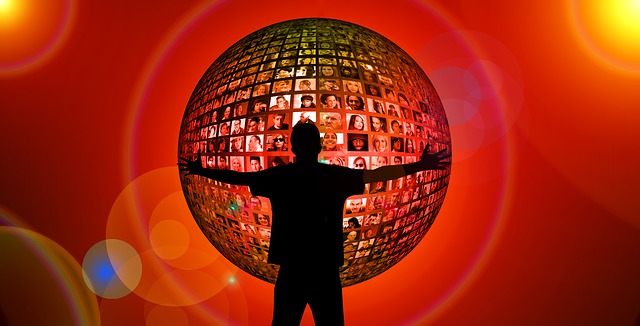clear

source:
geralt / Pixabay
It is a very effective tool for that matter.
One of the fascinating things about social media is how it is all-inclusive. Everyone has an equal platform to voice their opinion. This is a break from traditional media which restricted those who could have a voice. Take for example the civil rights movements from the 1960's to the 1980's, there was a famous face behind any political activism. Whether it was Martin Luther King Jr., Cesar Chavez, Che Guevara, Gloria Steinem someone who could rally the masses with charisma, and inspiration. However, recent protests that happened online such as the #MeToo movement by women, black lives matter, occupy wall street, and many more have shown that social media has changed activism. Years before it would take weeks of planning, ads on newspapers and televisions, just to organize a successful protest, now with social media, its a tweet or Facebook post away and millions from around the globe can join your cause. A good example of such a protest was the Occupy Wallstreet protest which happened in 82 countries and involved millions globally. That is an audience no traditional media can boast off. Since the onset of social media, we have seen governments trying to ban social media in countries where there have been massive protests. But that only adds fuel to the spirit of activism.
 0
0
clear
 Alvine Spencer
5 years, 7 months ago
Alvine Spencer
5 years, 7 months ago
Of course it can. Social media is a great tool to enhance democracy and positive changes in society. It can be used for notifying people for new humanitarian events (collecting money for various causes, gathering supplies for the homeless people). It can also be used for motivating and calling people to organize and attend the protests against government or other social anomalies in society. If someone firmly believes in their causes and has courage to pursuit them, social media is a powerful tool if used correctly.
 0
0
clear
 Marja Radić
5 years, 8 months ago
Marja Radić
5 years, 8 months ago
Our growing love of social media is not just changing the way we communicate – it’s changing the way we do business, the way we are governed, and the way we live in society.
As a society, social media impacts our daily lives in ways that we could have never imagined five years ago. 81 percent of divorce lawyers have confirmed an increase in cases using social networking evidence in the last 5 years. Social networking sites like Facebook, Youtube and Twitter are fast becoming a constant source of alternative news for Internet users, and also becoming a channel in which users can direct the focus of national news media.
The Arab Spring is perhaps one of the best-known examples of how social media can change the world. But it’s about more than just bringing together activists: it’s also about holding human rights violators to account
This capacity for social media to bring together disparate but like-minded people is also helping fight another enormous challenge: climate change. “Social media has become an important tool for providing a space and means for the public to participate in influencing or disallowing environmental decisions historically made by governments and corporations that affect us all. It has created a way for people to connect local environmental challenges and solutions to larger-scale narratives that will affect us as a global community,” says Shannon Dosemagen.
 0
0
clear
Social media is a very democratic platform. If you feel passionately about something you can disseminate your opinion via social media. Many people are skilled at this, and gain many friends and followers online who will "like" and "share" their views. In some cases social media influencers have become inspired to become politicians and use their media followers to vote for them in real life. Others use their influence to organise rallies in real life, or sign online petitions, or crowdfund to make change.
 0
0
clear
Any individual can be the first snowflake to begin an avalanche but without being joined by many, many others they will remain just a snowflake. Social media is a great way of making individual voices louder and stronger. Traditional media has often allowed only a relative handful of individuals, journalists, celebrities, broadcasters and writers, to have the loudest voices to influence change. But above them has always been piublishers, producers, advertisers and distributors who control the mechanisms of the media to disperse those opinions.
By contrast, social media is made up of amny, many individual voices, with the odd celebrity or journalist elevated somewhat, by having more followers for instance, but no more access to or control of the medium than any other individual. In this context the reach of any opinion is only as extensive as the number of other individuals wiling to share it. Perhaps a celebrity might be able to infuence fans to share a little further than an ordinary individual, but what really helps an idea to spread on social media is how much it touches and connects with other individuals.
Thus an inspiring idea, a petition, a protest, a call to action, coud get lost in a sea of competing voices. But it could also get picked up, shared and shared again and spread to th point that it trends and goes far beyond the original community of voices who first connected with it and becomes a catalyst for action or change.
The ability of dissenting groups to meet, share their opinions, realise they were not alone and then, only after the other things had been established, to co ordinate their actions, was central to the events of the Arab Spring in 2011, particularly in Egypt. However, the roll back in most of these countries, and the carnage in Lybia and Syria, make it clear that traditional power, or violent methods of obtaining it, are still quite a bar to change, even from so powerful a medium for bringing people together as social media.
 1
1
clear
 Andrew Tildesley
6 years, 11 months ago
Andrew Tildesley
6 years, 11 months ago
Social media can successfully be used as a platform to get a single voice heard by the use of its basic function, to share material. By uploading any one thought to Facebook or Twitter, it has the potential to reach a global audience. If one individual makes a call for a change in society on social media, all it takes is for one person to agree for the message to spread. As soon as one friend clicks 'share' or 'retweet' on the message, it reaches a new audience. For every subsequent share of the individual's thought, it massively spreads the message to new geographical locations as well as classes of society. With more people spreading one message, it has a public backing and fuels discussion. With many people sharing the ideals of the first individual, it has greater chances of action being taken. Take for example a petition. If an individual posts their own petition on their Facebook page, the use of sharing on the social network will help this petition reach more and more people - perhaps more than it ever would have. It may easily, and quickly reach the number of signatures it needs to get considered - and to make a change in society.
 0
0
clear

Sign up to post or vote on answers.
Improveo will help systemize your knowledge.
